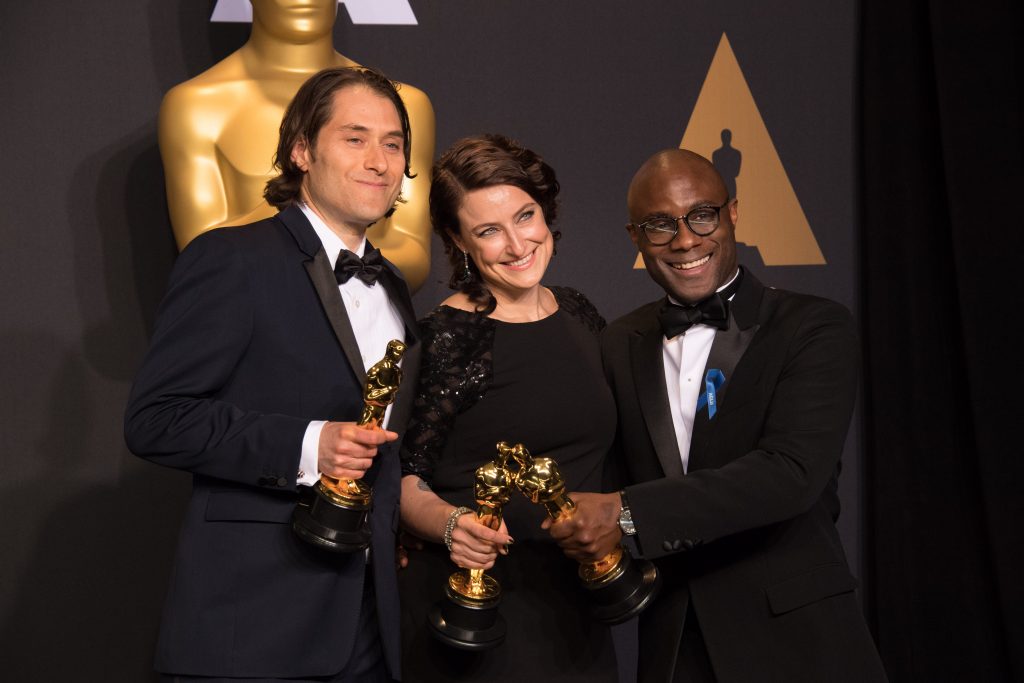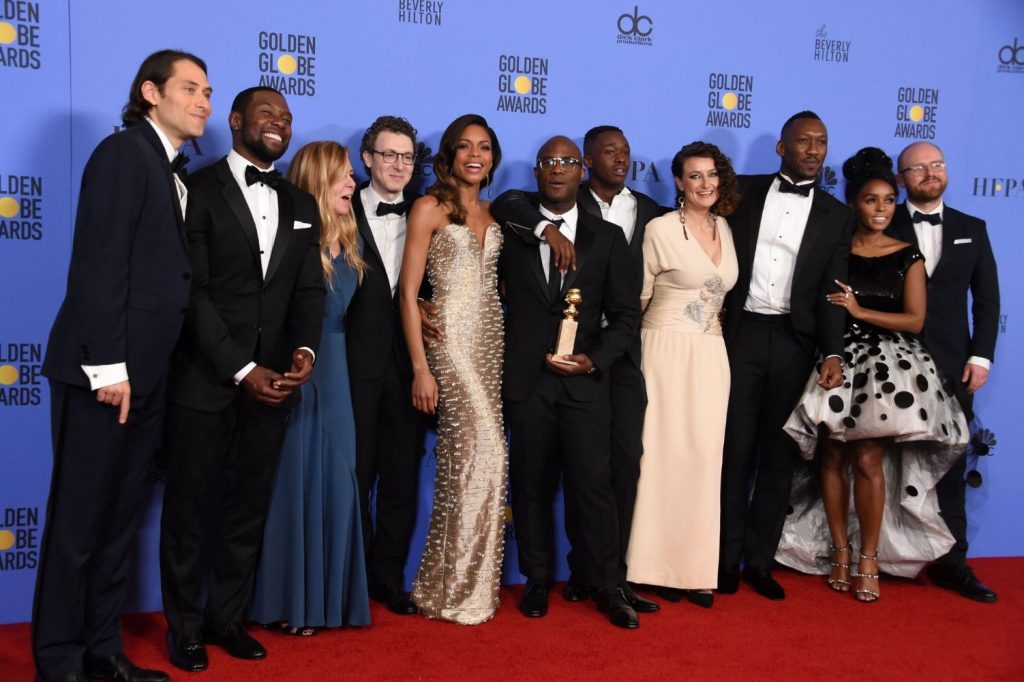February 27, 2017
by Carla Hay
The 89th Annual Academy Awards took place on February, 26, 2017, at the Dolby Theatre in Los Angeles.
Oscar wins:
Best Picture (for producers Adele Romanski, Dede Gardner and Jeremy Kleiner)
Best Adapted Screenplay (for Barry Jenkins and Tarell Alvin McCraney)
Best Supporting Actor (for Mahershala Ali)
https://www.youtube.com/watch?v=S5AQbarLcdo
Here is what these Oscar winners said backstage in the Academy Awards press room.

BACKSTAGE INTERVIEW
What went through your head when “La La Land” was announced the winner of Best Picture, and then just a couple of minutes later it was “Moonlight”?
Barry Jenkins (writer/director): I think all the movies that were nominated were worthy, so I accepted the results. I applauded like everyone else. I noticed the commotion that was happening, and I thought something strange had occurred. And then I’m sure everybody saw my face. But I was speechless when the result … that was awkward, because I’ve watched the Academy Awards, and I’ve never seen that happen before. And so it made a very special feeling even more special, but not in the way I expected.
“Moonlight” feels a bit life‑changing because it’s such an experience of filmmaking for us as audience members. For you guys, being so involved in the project, what will you remember the most about this life‑changing experience for you?
Jenkins: The last 20 minutes of my life have been insane. I don’t think my life could be changed any more dramatically than what happened in the last 20 or 30 minutes. But I also think, too, working on this film with everyone here, all the cast that is somewhere drinking champagne, I’m sure, it’s just been otherworldly, I will say.
And I never expected so many people to see the film, but even a step further, so many people see themselves in the film. I was in Germany, and this guy stood up and said, “I’m from rural Germany, you know, and 20 minutes into this film, I didn’t see Alex Hibbert. I saw myself.” And that was how I felt in working on it. I had one idea of what I was doing, and then I realized that everyone else was bringing this other thing that was much more beautiful than my idea could ever be. So, yeah, beyond life‑changing.
Given the impact that “Moonlight” has had, do you think that this will help break down barriers for more stories about LGBT people of color?
Tarell Alvin McCraney (writer): The hope that we have today about telling stories is that those people, the ones who we are leaning on to make those stories, were watching and found the platform that they saw they could stand on. I remember sitting back somewhere watching Dustin Lance Black accept for “Milk,” and thinking, “Maybe one day … me.” And here I am. So if that’s any indication, I hope we are moving in that vein. I hope the storytellers up here and their proud journey here can imprint on someone out there watching, that they too can stand here too, and also tell their stories as daringly, as intimately as possible.
Jeremy Kleiner (producer): I might just add … because I didn’t get a chance to thank ‑‑ we didn’t get a chance to thank our courageous distributor, A24. This project didn’t really have a lot of comps. It was kind of outside of, like, the modeling of what, you know, a movie should be in terms of return on investment and that. And I think that this outcome for “Moonlight,” independently of tonight, but just the effect it’s had domestically around the world hopefully creates some incentives to make stories like this in all different forms. So that ‑‑ and that was not far from our minds as well.
This question is for Barry Jenkins. What explanation were you given for the mixup tonight?
Jenkins: No explanation. Things just happen, you know? But I will say I saw two cards. And so things just happen, you know? I wanted to see the card to see the card. And Warren [Beatty] refused to show the card to anybody before he showed it to me. And so he did. He came upstairs, and he walked over to me, and he showed the card.
Everybody was asking, Can I see the card? And he’s like, “No, Barry Jenkins has to see the card. I need him to know.” And he showed it to me, and I felt better about what had happened. I will say to all you people, please write this down: The folks from “La La Land” were so gracious. We spent a lot of time together over the last six months, and I can’t imagine being in their position and having to do that. I wasn’t speechless because we won. I was speechless because it was so gracious of them to do that.
What did the card say?
Jenkins: The card said, “Best Picture: ‘Moonlight.’ Dede Gardner, Jeremy Kleiner, Adele Romanski.” But there were two cards.
Did you all have speeches prepared for Best Picture? And if so, what were you going to say?
Adele Romanski (producer): Yeah, we might have had a couple ideas. But I think the way that what went down, we kind of had to roll with it. I feel good about what was said. But I have to admit it was a bit of a fugue state, and I don’t know that I remember it. We didn’t thank people that we probably should have thanked.
Jenkins: Yeah, I absolutely wanted to thank A24 a thousand times because when I first set out to make this film with Adele, there was a budget that we had, and you guys know what the budget is now. It’s 1.5 [million dollars]. The budget we were offered before that was much, much smaller. And without us asking, they increased that budget because they believed in the project. They never told us to alter anything in that process.
So my whole acceptance speech was going to be in thanks to them, because it’s amazing to be Barry Jenkins right now, but it was not a year and a half ago for a guy who made a movie for $13,000 and hadn’t made a movie in seven years at that point. So I was going to give as much love to them as I possibly could with my time on the mic. And it’s unfortunate that things happened the way they did. But hot damn, we won Best Picture.
Barry, for you this has been a long time coming, and it’s been a long journey for you. Ironically, the stories or the themes told in “La La Land” could apply to you as well. What are your feelings toward Los Angeles and this city and the people in it?
Jenkins: I love L.A.! How could I not right now? You know, I’ll speak about “La La Land.” When I saw Justin [Horowitz, one of the producers of “La La Land”] at Telluride, I told him that I hadn’t been home in about two months. And I can see my apartment in the background of the opening shot of that film, and I was nostalgic for L.A., which is a crazy feeling for a guy from Miami who’s always had a hard time in L.A.
But you’re right. This is a fulfillment of a lot of things. And I also would have thanked Darnell Martin who gave me my first job in this city. Yeah, she took Chiron and said, Hey, come be my assistant and learn everything I have to teach you. So a lot of things have come full circle right now. This circle was much bigger than I ever could have imagined for myself or for this film.
But it feels good, man, you know. And I guess anything’s possible because most of the voters who voted us Best Picture, they reside here in Los Angeles, and yet they voted a film about a marginalized character from a marginalized community told in a very unorthodox way into Best Picture. And so, God bless L.A.
First off, why do you think that “Moonlight” resonated so deeply with audiences? And secondly, how do you think that winning this Oscar is going to change your life or your career?
Jenkins: I mean, my career, that part’s pretty clear. You know, I write an e‑mail, somebody’s going to reply at this point. Or I make a phone call, somebody is going to call back. So that part is cool.
But why this film? You know, I can’t say. I kind of took it off the table when we came to making this. I mean, Tarell put so much truth in what he wrote in the piece “In Moonlight Black Boys Look Blue.” I try to take truth and manifest it on screen. And the only thing I can speak to is that whatever authenticity, whatever fire this guy had in his belly, people saw it, and they reflected the same fire in their belly.
McCraney: Barry does this often where he deflects the fact that, you know, sure, I may have brought my truth to the table in the original script. However, what Barry continued to do when he rewrote the script and when he started shooting, when he started casting, when he was working with those actors, was continue to see himself in those moments, those intimate moments. And everybody can relate to that, because we all know that moment that we felt awkward, because Barry found the moment he was awkward, and he put it on screen.
And so for me, that’s the lightning rod that keeps bringing people back. We’re putting our true feelings, our true selves there. And this man did it, you know, in 25 days with a cast and crew who was in and out in Miami in the dreaded heat, but we did that with love and compassion and fullness. I think that’s what keeps bringing people back to the cinema.

